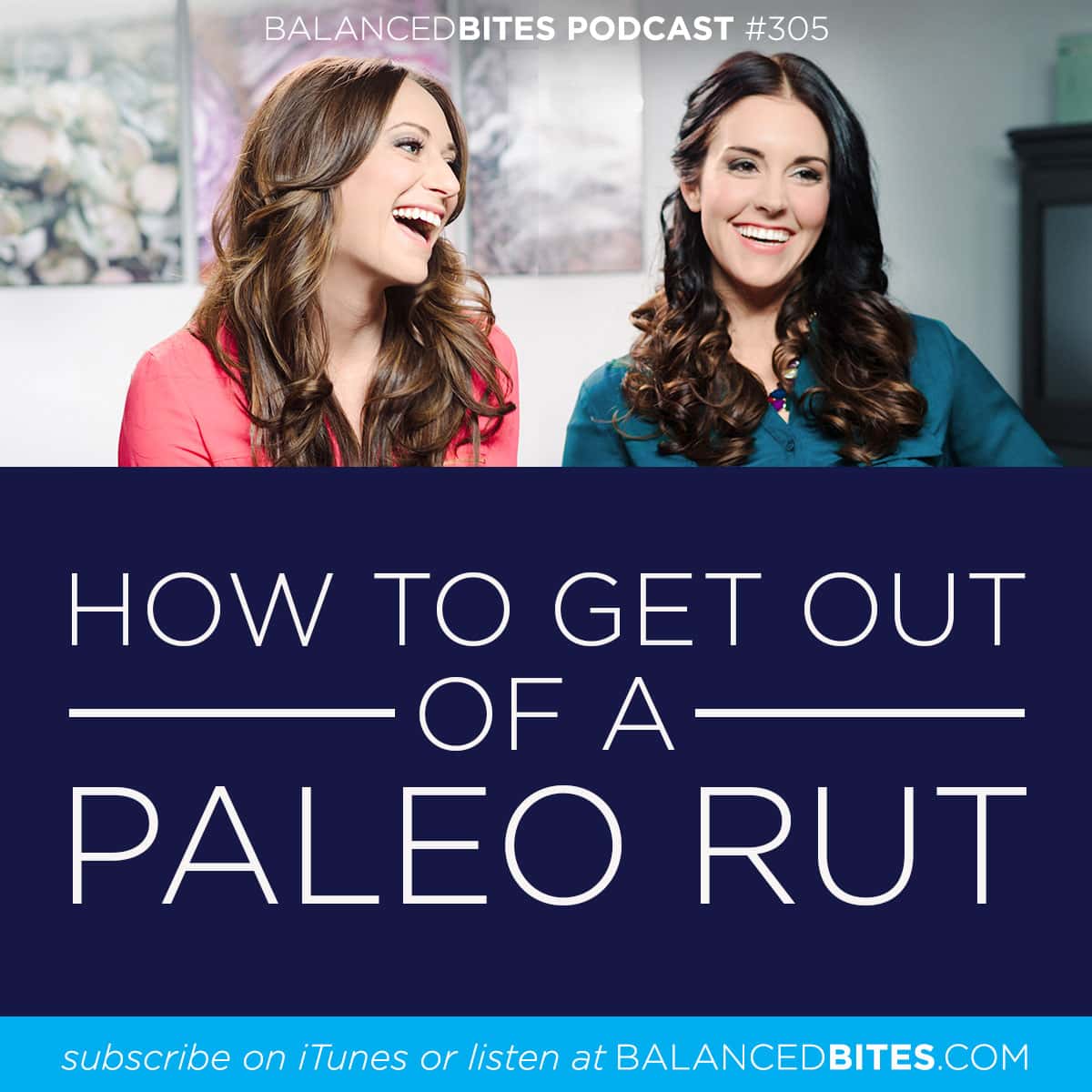 Topics
Topics
- News and updates from Diane & Liz [2:01]
- Last night's dinner [7:47]
- Shout out Robb Wolf: What the Health Rebuttal [9:48]
- Stuck in a paleo rut [11:01]
- Rules of thumb [17:06]
- Eating and metabolism effects [22:07]
- Stress and its effect on the metabolism [27:05]
- What you missed on Instagram [30:12]
- Episode takeaways [33:25]
Subscribe to DianeSanfilippo.com
What The Health: A Wolf's Eye Review
The episodes are also available in iTunes, Spotify & Stitcher.
![]()
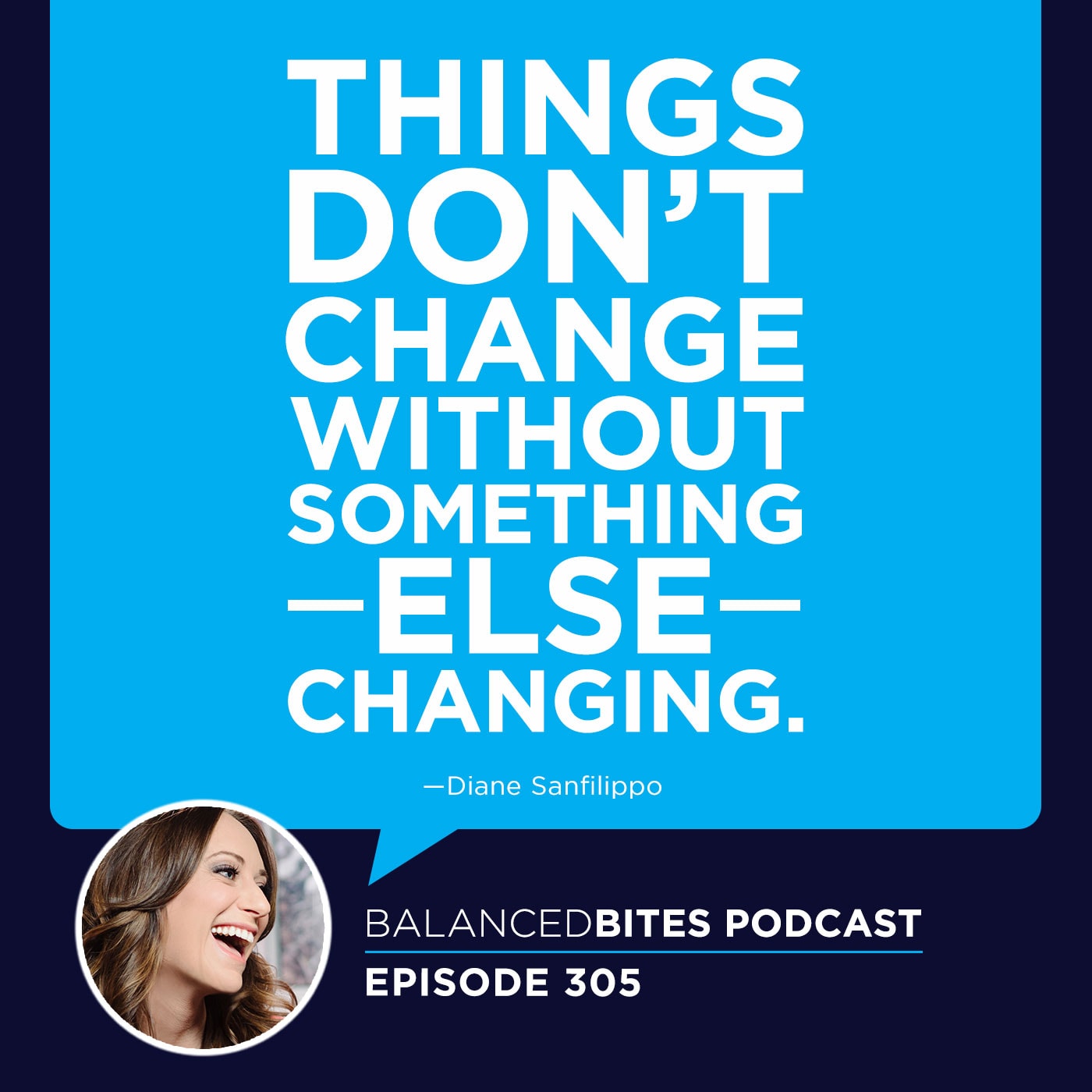
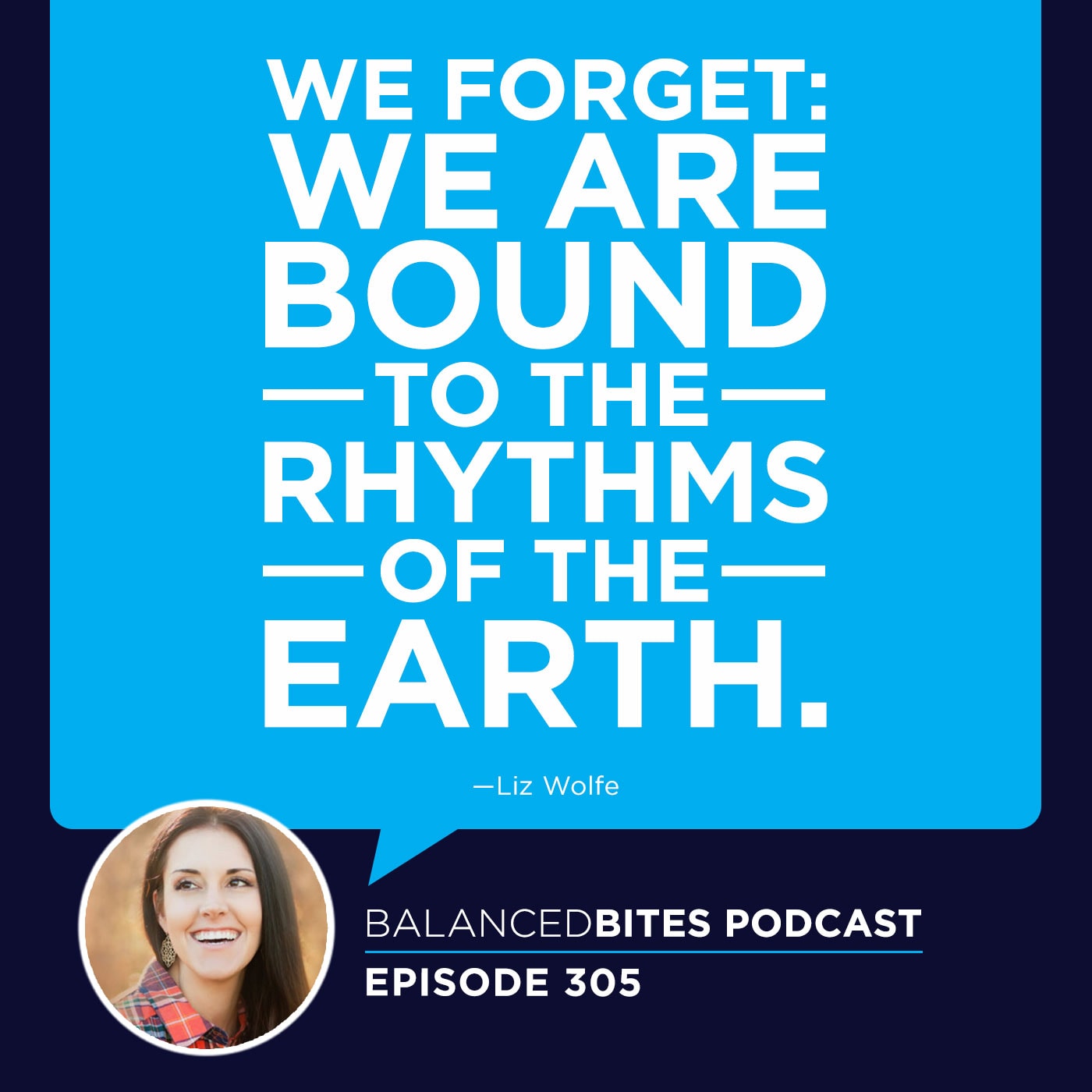
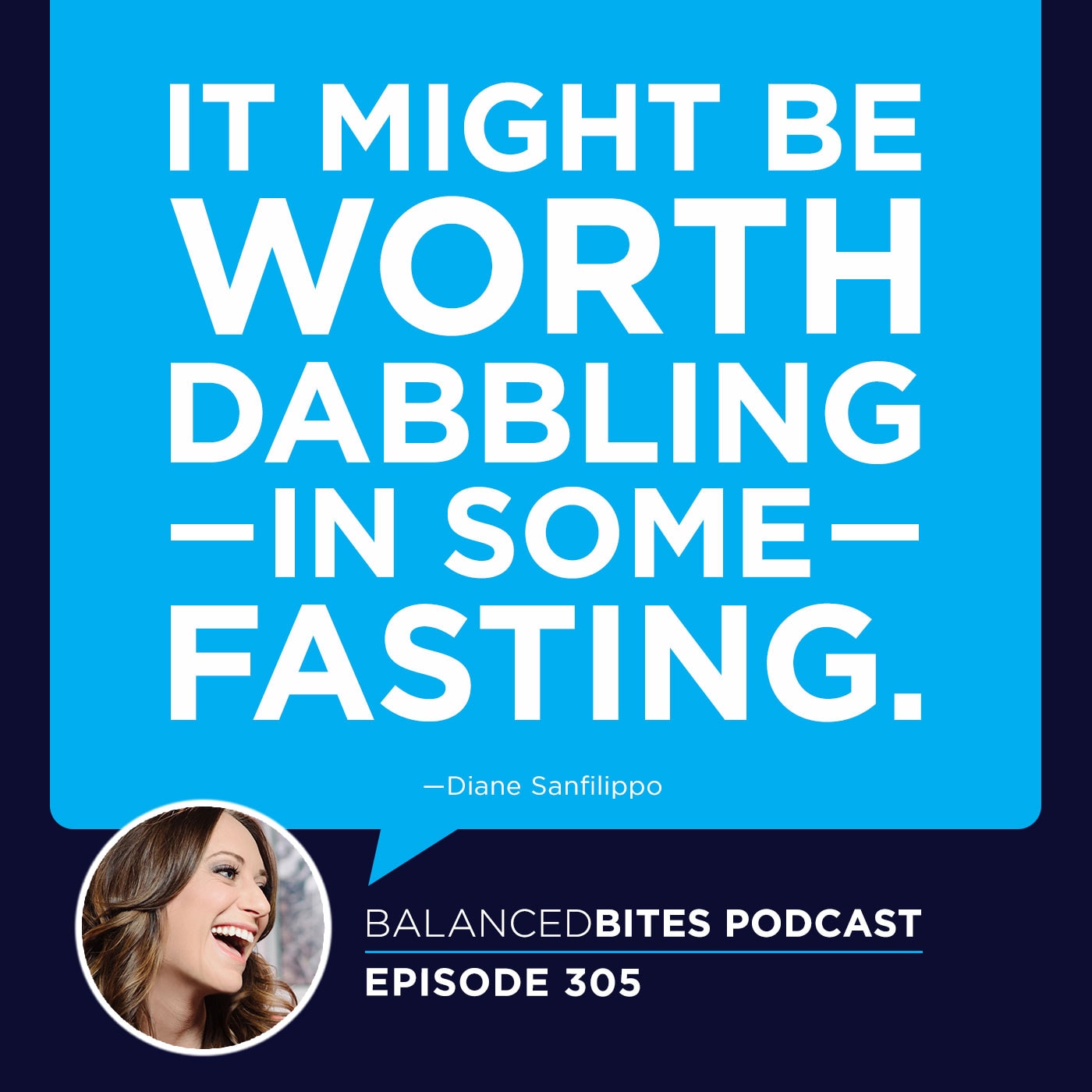
You’re listening to the Balanced Bites podcast episode 305.
Diane Sanfilippo: Welcome to the Balanced Bites podcast. I’m Diane; a certified nutrition consultant, and the New York Times bestselling author of Practical Paleo and The 21-Day Sugar Detox. I live in San Francisco with my husband and fur kids.
Liz Wolfe: I’m Liz; a nutritional therapy practitioner, and author of the Wall Street Journal best-seller Eat the Yolks; The Purely Primal Skincare Guide; and the online program Baby Making and Beyond. I live on a farm in the mystical land of the Midwest, outside of Kansas City.
We’re the co-creators of the Balanced Bites Master Class, and we’ve been bringing you this award-winning podcast for nearly 6 years. We’re here to share our take on modern paleo living, answer your questions, and chat with leading health and wellness experts. Enjoy this week’s episode, and submit your questions at http://blog.balancedbites.com. Or watch the Balanced Bites podcast Instagram account for our weekly calls for questions. You can ask us anything in the comments.
Remember our disclaimer: The materials and content within this podcast are intended as general information only, and are not to be considered a substitute for professional medical advice, diagnosis, or treatment.
Before we get started, let’s hear from one of our sponsors.
Liz Wolfe: The Balanced Bites podcast is sponsored in part by the Nutritional Therapy Association. The NTA trains and certifies nutritional therapy practitioners and consultants (including me; I’m an NTP), emphasizing bio-individuality and the range of dietary strategies that support wellness. The NTA emphasizes local, whole, properly prepared nutrient dense foods as the key to restoring balance and enhancing the body’s ability to heal. Nutritional therapy practitioners and consultants learn a wide range of tools and techniques to assess and correct nutritional imbalances. To learn lots more about the nutritional therapy program, go to http://www.NutritionalTherapy.com. There are workshop venues in the US, Canada, and Australia, so chances are you’ll be able to find a venue that works for you.
1. News and updates from Diane & Liz [2:01]
Liz Wolfe: Alright. Hi Diane!
Diane Sanfilippo: What’s up.
Liz Wolfe: What’s up with you this week?
Diane Sanfilippo: Well, my friend Jessica, who I think; I don’t think we had her on this podcast, but I had her on my Build a Badass Business podcast. She lives here in San Francisco, and is a wellness coach as well, and also an accountant. So anyway, long story short. I had interviewed her for information on accounting for business folks. But she is, and this is the real reason why we’re friends, just a great, like gluten-free treat fan, and chocolate fan, chocolate lover. I mean, I need to have my friends be either interested in treats now and then, or a little bit of a foodie. Like, you're not a foodie in the same way I might be, but you’re definitely a foodie in that you and I used to go seek out farm to table restaurants when we would tour and travel and stuff like that.
So, my friends need to be into food. Bottom line. So she’s into food. All of that to say, she showed me that there's this place that basically I’ve probably walked past countless times called Dynamo Donuts here in San Francisco, and they have a little hut down at Crissy Field, which is a common place lots of folks run and walk and bike. Tourists will go by. And we grabbed a little gluten-free donut. It was a carrot cake one, and I brought one back for Scott. And it was a nice little treat to have. And I didn’t have to travel to Vancouver for it, so that was nice. So that was my little, I don’t know. Just fun thing from the weekend.
Also, in the goings on in Casa Mills-Filippo. Which is what I call it {laughs}. I have this new ficus tree.
Liz Wolfe: Ficus?
Diane Sanfilippo: I named him.
Liz Wolfe: It’s a ficus?
Diane Sanfilippo: It’s a ficus. And I’m kind of laughing on the inside, because Nikki, who, you know, is on Team Balanced Bites. She wrote Bart, the plant update. But the plant’s name is Bob, as in Sideshow Bob. I think she wrote Bart because she was thinking the Simpsons, since I was referencing the Simpsons. But the plant kind of looks like Sideshow Bob’s hair. Do you know what that looks like? Like, Carrot Top? Sideshow Bob?
Liz Wolfe: Yes.
Diane Sanfilippo: Ok. Whatever. Anyway. I’m struggling with this plant. And I’ve Googled the bejebus out of it. {laughs} I don’t know what to do with him. I’ve had him for a few weeks. He’s losing a lot of leaves. Some of them are still green. Some of them are slightly yellowed. But he appears to have new growth at the same time. I’m turning to look at him as I say this. Because I’m really not sure what to do with him. But one reader on Instagram said, “Sometimes they can lose leaves for up to a month when you first change their environment.” So like taking him home from the store. So I’m holding out hope that it’s just a matter of environment change, and he’ll figure it out and stop, you know, losing his leaves. But anyways, if you guys have tips or advice on ficus tree care in the Bay area, especially. Because the climate here is a little special. Feel free to comment on the blog post to this episode. I would love to hear your thoughts. This is my request for advice on the ficus tree. Normally I can only keep plants alive that just wilt when they’re thirsty, and then perk up when they’re not, and that’s about all I can handle. So there’s that.
That’s what’s up with me. Those are the really, high level, important updates. {laughs} What’s going on with you?
Liz Wolfe: I’m sorry to say I have no fical updates. Or fical wisdom. I have nothing for you. I don’t even know what a ficus tree is. I felt like ficus was a character on Salute Your Shorts. No?
Diane Sanfilippo: {laughing} It could also be.
Liz Wolfe: Ok.
Diane Sanfilippo: I don’t know.
Liz Wolfe: Not a clue.
Diane Sanfilippo: Now I have the theme song to Salute Your Shorts in my head, by the way.
Liz Wolfe: Good.
Diane Sanfilippo: Which I know. But ok.
Liz Wolfe: Stringing the underwear up the flagpole?
Diane Sanfilippo: Yes.
Liz Wolfe: Budnick?
Diane Sanfilippo: Yes.
Liz Wolfe: Yeah. So, nothing’s really up with me. As you can tell. I’ve just got my mind on lots of really important things. We’ve been grinding on Baby Making and Beyond. Which is really exciting. Got a great research team in place, and we’re starting to build that more. I think folks can expect to hear more here pretty soon. Probably in the next couple of some span of time. Weeks, months, years. Eventually, yeah, you’ll hear something. I think you’ll hear something pretty soon though.
Diane Sanfilippo: {laughs} A couple of somethings.
Liz Wolfe: Sign up for my email list. Yeah, there will be something. I do think that there will be a beta phase. Because we really need to find out how much of a gap there is between what we really, really feel like people need to know and what people really, really feel like they want to know. So we will probably open it up for like a beta wave. It will be a limited. There will be limited spots, so there will probably be an email that goes out eventually, either from myself or Meg the midwife, or both. Basically with a form that will shut off after we’ve got as many beta sign ups as we can handle. As many people as we can handle for the beta. So, just everybody keep your eye on it. Hopefully over the next; I don’t think this one airs for a couple of weeks. So hopefully in the next month or so.
Diane Sanfilippo: Sweet.
Liz Wolfe: Yeah.
2. Last night’s dinner [7:47]
Diane Sanfilippo: Alright. We’ve got a little segment here we’re calling “Last Night’s Dinner.” And if you follow me on Instagram, then you’ll know this wasn’t actually last night according to when the episode airs. But we’re just going to call it last night’s dinner, and we’re all going to roll with it. Ok? Ok.
So, we’re going to share a segment like this from time to time, and just talk about what we had for dinner last night. And this is totally random, so Liz has no idea that this was coming up. And I don’t know what was dinner last night for your family, but last night was a little rare. I usually don’t go dabbling in a lot of recipe creation all the time. Unless I’m really working on something for the blog or a book. But, I was playing around with a recipe for some wings. As sort of directed by Michelle Tam. She’d been using this apricot spread that’s just fruit, and some fruit-based things. And I just kind of got an idea. So I promise to blog that recipe when I perfect it. But it reminds me of Saucy Susan. If anybody used to eat Saucy Susan, back in the day. It kind of reminds of that type of sauce. And it’s very, I don’t know, sticky Asian type of sauce. And it just came out really, really delicious. And that was what we had for dinner last night. Those wings and some arugula salad. What was last night’s dinner for you?
Liz Wolfe: I’ve been racking my brain since you said that was this segment, and I cannot remember.
Diane Sanfilippo: {laughs}
Liz Wolfe: I literally cannot remember. It’s terrible. Oh, no. We did; yeah, I know. There it is. We did spaghetti sauce and spaghetti squash.
Diane Sanfilippo: That’s a pretty common one for you guys, right?
Liz Wolfe: Yeah.
Diane Sanfilippo: You guys put that on the rotation.
Liz Wolfe: Yeah. Probably at least once a week. It’s pretty easy.
3. Shout out Robb Wolf: What the Health Rebuttal [9:48]
Diane Sanfilippo: That’s a good one. I’m laughing about the momentary lapse in dietary recall. Because it’s just so timely. And I think I will also give a quick shout out to Robb Wolf, who did a recent “What the Health Rebuttal” Post. So for people who are asking about that. We’ll link to it in our show notes. But I’m not about to do that. And it just kind of made me laugh. And you’ll know what I’m talking about with your dietary recall when you guys read the post, and if you’ve seen the movie. And maybe we’ll talk about it another time. But that won’t be today.
Diane Sanfilippo: Today’s podcast is sponsored by Vital Choice seafood and organics. Purveyor of premium sustainably sourced seafood and a certified B corporation. Vital choice offers a wide range of fish, shellfish, humanely raised meat, protein rich bone broths, and paleo friendly snacks like organic dark chocolate, super antioxidant trail mix, and bison jerky. As the days get longer and the grilling season heats up, www.vitalchoice.com is your source for real food.
4. Stuck in a paleo rut [11:01]
Liz Wolfe: Ok. So today we are talking about how to get out of a paleo rut. For those who are “doing everything right”, but starting to see maybe a reversal of what previously had been improving. This is going to be a hot one, I think.
Diane Sanfilippo: Yeah. This question came to me via email. And I’m actually going to have you read the question quickly, without their names for privacy. But this is also a common one that we get through the podcast form, on Instagram. We get this question in a lot of different ways. And I think this was just a great time to address it in an episode. So let’s hear the question.
Liz Wolfe: Alrighty rooty. “Hello Diane. Help! You have changed our lives. My husband and I have been following your diet guidelines for about 3 years now. You transformed our lives; thank you so much. But here’s our story. We changed everything about the way we eat, and have been on the paleo/Diane diet consistently since 2014. My husband lost 30 pounds, and I lost 20 pounds. We both felt great. We did not cheat, and regularly did the 21-Day Sugar Detox, just to make sure that we hadn’t gotten into bad habits in our diet. Then it slowly started, without changing what we were eating, we slowly started to notice a weight gain over the winter.
My husband and I both regained 10 pounds of the weight we had lost. We’re now on a diet we hope will work. All paleo, but changing our eating timing. Eggs and bacon for breakfast, vegetable smoothie for lunch with protein, usually chicken. Then full-fat yogurt for supper. We’re seeing some weight loss again. Can you help? We simply don’t understand why the weight came back on. We’re uncertain about our eating habits, and dearly wish to be back to our svelte sizes again. So grateful for you and how you’ve helped us eat properly. Kindest.”
Diane Sanfilippo: Well. First and foremost, pretty much a huge congrats on making those big lifestyle and diet changes. I think that it’s important to recognize how big of a deal it is to make these changes, and stick to them in the long-term. So I just first want to say that.
But the question was specific to weight loss, and I think we can shed some light on this. With regards to weight loss, or to allergies returning or digestive issues coming back, I think there are a lot of things that a lot of us experience a benefit to changing the way we eat, and then slowly over time things can change either back to how they were, or they start to sort of backslide. We just start to experience things, and we don’t know exactly why.
I have a couple of thoughts here. And I’d love to hear your take on this too; obviously. As we always do on this show. But there’s a couple of things. One is, I don’t know if I believe that nothing has changed. I think sometimes what happens is we assume that over the years, we’re eating the same foods and “out of nowhere” things start to change. I’m not sure about that. I think there absolutely can be sort of a plateau and a resistance. Like, our body gets used to things, and maybe that weight can come back on. But I don’t think things change without something else changing. I don’t think you would have gained weight back without something going on there. So what I’m saying is, I’m curious about what could have changed that you may not have noticed. Because it only takes some small things to change for some weight to come back on.
So first thing I’m curious about is, and she did mention over the winter. So the first thing I’m curious about is, was the activity level different over this time? And over the winter that can definitely be different for a lot of us. Maybe you live somewhere where it’s warm. So we don’t know. Maybe it was a particularly bad or long winter, and they were more active and then less active.
I’m not saying this to lay blame at all. I’m just saying this to shed light. We just sometimes don’t realize “Oh my goodness, I thought I really was doing the same things, and actually I wasn’t.” If I were to think that lifting weights without any high intensity intervals is the same as doing CrossFit, just because I do it 5 days a week, I’m not recognizing that those are different things. They’re different inputs. So the results will be different from that. So I’m just saying there might be something little that has a bigger impact than they realize. That’s the first thing.
The second thing here is, nothing changes if nothing changes typically. But maybe the body is plateauing. Maybe they're just having this experience where something does need to change. Maybe what they need to do, and she mentioned that they were addressing their timing, and that seems to be working again. So to that end I would say, try something different. Try something different. If what you’ve been doing all this time doesn’t seem to be working still, try something different. And that doesn’t always mean to restrict more. That’s something that we talk about a lot, is that often when people see things not continuing to move in a direction they want, they go towards a direction of being more strict. And I think that that’s not always that helpful.
I do want to point out that their ages are 72 for the male and 60 for the female. And I think that that has some bearing. I don’t like for us to always blame our age on things, but it does have some bearing on the way our hormones are working, our metabolism, all of that. So I don’t want them to beat themselves up over the fact that this stuff is maybe rebounding a little bit. But just stay the course, and try a few different things.
5. Rules of thumb [17:06]
Diane Sanfilippo: So, I think that where she says, “eggs and bacon breakfast, vegetable smoothie for lunch with protein, and full fat yogurt for supper.” I don’t know that I would want to recommend that that become the new way for forever. If they feel good doing that, and are happy with it, then that sounds ok. But I don’t know if having something as small as just some yogurt for dinner is something that’s maintainable for a lifestyle. This sounds a little bit more like a diet. And that’s not to say that that can’t be helpful for a period of time. But I think what we’re trying to do is find a way to adjust things to a lifestyle that’s working.
So, the last thing to that end. Sometimes what you’ve been doing for a while isn’t what will work for forever. And I think we’ve all seen that. You and I have gone through times where we’re eating more carbs, or a little less carbs. For me, at least. And we just have to try different things, and I think that that’s a really good point to remember here. To know that it’s not always going to be the same thing that continues to work for us in the longer term.
Liz Wolfe: So, some of the notes that I jotted down about this question. I probably am going to jump around a little bit, and I apologize for that. But the first thing I wrote was, your current intake, what you’ve chosen to switch to is any indication, that’s really not a lot of calories. So I’m just kind of wondering if maybe the tendency was towards undereating for those first couple of years of this lifestyle change. It’s really cute that she called it the Diane diet, but there is no Diane diet.
Diane Sanfilippo: {laughs} Totally.
Liz Wolfe: There’s just a set of rules of thumb. Meal plans, some recipes, things like that. But every single person that takes on these challenges of changing how they’re eating are also agreeing to really pay attention to whether or not they’re fueling themselves adequately. Whether maybe the weight is coming off too fast, or maybe the weight is not coming off at all, and a few things need to be tweaked. So that’s not at all to say that these folks were not paying good enough attention. That’s more to say that this is normal. This entire thing is a process of adjustment. There is no formula to this. We like to think there are. We write books about it. But this is true in dietary habits and the same way it’s true in life. You have to be on this constant, never-ending journey of self-discovery that’s basically just guided by rules of thumb.
So, in life, you need to be nice to people. And in your diet, don’t eat franken foods. And pretty much the rest of it is up to you. It’s up to you to tweak, to kind of choose your own adventure based on these tidbits of information that we like to give to people. So the possibility here is, as they were learning, maybe they were also undereating a little bit. Or perhaps this is just a totally normal adaptation that their bodies when through in the winter. Maybe their bodies adapted to this new diet for those first couple of years, maybe the body was dropping weight and whatever state. Whether it was a state of stress or a state of greater health, we don’t always know. It depends on what’s going on in people’s lives. What kind of diet they’re switching from. That type of thing.
But perhaps the weight came off for the first couple of years, and then the body kind of went back to that normal, cyclical, seasonal rhythm where we pack on a little bit of extra meat during the winter, and then it slowly comes back off during the summer. I think we really forget, sometimes, that we are bound to the rhythms of the earth.
Diane Sanfilippo: Mm-hmm.
Liz Wolfe: And seasonally, these things happen. But when you freak out about it, and you start to really worry that something is wrong with what you're doing and you start to move all these pieces around, instead of just kind of going with it and observing what’s going on. Sometimes that stress of, “Oh my gosh, what am I doing wrong? What do we need to change to fix it?” That will actually perpetuate. Or at least make you more resistant to having that natural trimming down cycle as the spring and summer come along.
So that was something I was thinking of. And you kind of have different choices here. You can either, don’t freak out. Think about it in that seasonal context that I just talked about. Or, on the other hand, you could take a really good look at what your body is telling you and adjust accordingly. Which is what it appears they’re attempting to do. But I would say, eggs and bacon, vegetable smoothie for lunch with protein, full fat yogurt for supper. I’m not super clear on the, I don’t know what it would be. The ethos behind this? I mean, it seems kind of like a periodic calorie loading and then a taper towards the evening.
Diane Sanfilippo: Yeah.
Liz Wolfe: It might not be enough. Male and female, too. That’s another thing. What’s right for one might not be right for the other.
6. Eating and metabolism effects [22:07]
Diane Sanfilippo: Totally. You know, I think it was a really good point that you made about, I think all good points. I think when you said, perhaps when they did this initially they dropped calories to a place. Which, not to say that they even intended to. It’s just a very common sort of pitfall that folks go either accidentally low-carb when they don’t mean to, or accidentally really cut calories farther than they intend to just because all of a sudden you're not eating all these foods you used to eat. And whenever we remove certain categories of foods, we invariably do tend to cut calories naturally. Unless we’re really paying attention to it.
Liz Wolfe: Yeah.
Diane Sanfilippo: So, one thing that could happen here, as well. Over the time of that initial loss, it’s possible that both of their metabolisms slowed a bit if they were undereating. And that’s something I talked with Dr. Fung a few episodes ago in the fasting episode. Where he was talking about the really big difference between fasting and reduced or restricted calorie diets, and how they have a very different metabolic effect. And if they didn’t listen to that episode. And I’m not even sure that they’re podcast listeners, because this came in through email. But it was just such a great question, and such a great topic, we pulled it here.
But it might be worth, for folks like this, to look at the idea of eating as you were, but then dabbling in some fasting. Especially if people feel like they don’t have a very active lifestyle that they’re fueling all the time. It could be something that has a hermetic or therapeutic effect for folks. And it could help with that kickstart to the metabolism without being a calorie restricted situation. And I think those two things get confused very easily. I was not personally very clear on them. The conversation I had with Dr. Fung did clear up some of that for me. Just explaining how zero food is actually better than a small amount of food, because of the hormonal signaling that will happen as a result of zero food. Because our body has an adaptation it can make to fasting that it can’t make to that restricted calorie approach.
So it’s just an interesting phenomenon that happens with our bodies. And I think that they could have experienced this slowing down of the metabolism in response to essentially dieting if their calorie intake was lower. Because the body will really adjust to what we are eating. I kind of joke sometimes that there are many days where I feel I eat enough for a 200-pound man, and how I’m not so much larger is sometimes beyond me because my appetite is insane. I really have a huge appetite. But as Dr. Fung pointed out, often our metabolism really does adjust to what we can eat. And that can be both up and down. And it won’t do that in the presence of poor quality food. If I were eating poor quality food, perhaps in slight excess, over time that would have different metabolic effects. So for these folks, I think that that could be something to consider. And I think you made a really good point about that, that it could have been this lower-calorie approach.
But I do think, also, sometimes people start out spontaneously reducing calories, and then when you get better at eating “paleo”, right, you're more familiar with it. You perhaps add more calories back because you’ve got it figured out. And that’s a good thing. But it could cause a little bit of that rebound weight. Does that make sense? Instead of not being prepared anymore, you actually have plenty of adequate, the right choices for you food on hand. So instead of having those days where you just didn’t eat enough because you weren’t ready for it, now you're so used to cooking the right foods. Does that make sense? We’ve seen it a lot. When people first make that switch.
Liz Wolfe: Yeah. It does make sense. But it would be way easier if we could just tell people to paleo harder, and the end.
Diane Sanfilippo: {laughs} Yeah.
Liz Wolfe: I mean, it just 100% depends. Some people under eat and drive their metabolic function down low enough that their body starts to hang onto absolutely everything. And some people eat too much, too much of a good thing. And it’s over the point at which their metabolism can actually handle it efficiently. So it’s tough. And it definitely requires a ton of willingness for introspection. And I feel like these folks found you in 2014. It’s been a couple of years now. They’ve got the rules of thumb down, and now they can start to really look deeper and get to know themselves and their bodies better.
7. Stress and its effect on the metabolism [27:05]
Diane Sanfilippo: I think that’s a great point. And it may be worth doing a little bit of journaling on it. Writing down what you're doing, including things like activity and sleep and all of that. Did something really stressful happen in your lives? If it’s both of you together, was there something traumatic? Was there a big event that happened? Did you lose a close friend or relative? Did you move? Did something go on? So, I would definitely address all of that.
And same for anyone listening who is going through this type of experience. I think we greatly undervalue emotional trauma in terms of the physical effects that it has. We also are not always super tuned in to when those effects might hit. Because sometimes they hit later, you know?
Liz Wolfe: 100%.
Diane Sanfilippo: It’s not always at the same time. So I think that’s worth noting, as well.
Liz Wolfe: And even on the flip side, this is really interesting that you bring that up. It’s possible that when they started losing weight and shifting their diet, maybe they were in a stressful period then, and they were so stressed and their body wasn’t hanging on to any weight. And now their healthier and their body is coming to a healthier setpoint.
For me, personally, over the last two years when I was really in the depths of anxiety, and really struggling with that, I got pretty thin. And over the last couple of months, that weight has crept back up. But I’m getting better. I’m getting so much better. Working with a therapist and everything like that. And now that’s going to be my soapbox for the next 10 years. Go see a therapist, and whatever your weight does after that, that’s where you're supposed to be.
Diane Sanfilippo: {laughs}
Liz Wolfe: But I feel like I’m getting so much better. I’m eating healthier. I’m taking care of myself again, and my weight is going up a little bit. And I’m totally ok with that. But maybe coming to that point in my life where I could honestly say that was a much more difficult and intensive journey than just figuring out what food was right for me.
Diane Sanfilippo: Amen.
Liz Wolfe: This episode of the Balanced Bites podcast is sponsored by our friends at Primally Pure Skincare. Primally Pure makes 100% natural and nontoxic skincare products that support radiant skin, a healthy body, and a happy self. They use ingredients like tallow from grass-fed cows; organic and fair trade coconut oil, and organic oils, herbs, and extracts to formulate effective products that also smell amazing and look beautiful sitting on your bathroom counter. At www.primallypure.com, you’ll find their bestselling natural deodorant that actually works; face mists made from locally sourced and organic rose and orange blossom hydrosols, and their brand new baby line. You’ll also find Diane’s favorite Primally Pure product, dry shampoo, and Liz’s favorite, the Everything Spray with magnesium. As a special bonus for you, Primally Pure is offering a free lip balm with your first purchase of one item or more. Simply add a lip balm to your cart along with any one item, and use the code “balancedbites”, one word no caps, during checkout to receive one of their lip balms for free with your order. Head to www.primallypure.com and check out their range of safe and effective all natural skincare products.
8. What you missed on Instagram [30:12]
Diane Sanfilippo: Alright, so for this part of the show we’re going to do a quick little “What You Missed on Instagram.” And I’ve been really, I’ve been into the Instagram stories thing lately. And I’ve noticed that you have been posting some little tidbits of life on the farm, and life with the little one. Which has been really fun to watch.
Liz Wolfe: Trying to.
Diane Sanfilippo: I love it. I’m really enjoying it. I feel like I get to see my friend during the day.
Liz Wolfe: I know.
Diane Sanfilippo: I like it. So, one thing you may have missed. And I don’t know if you guys can all hear it in my voice. I got this cold a while ago. I fought it off. I was feeling great. Then Scott got sick, and I was like, “I won’t get that cold again.” And it’s trying to get me. And I feel like I’m fighting it. And I feel like what I’m about to talk about is the reason why I’m really fighting it. This could be a total placebo effect, and I do not care one bit.
So, if you guys saw a few weeks ago in Vancouver, that’s when I was previously fighting this thing off. This hasn’t happened to me in a long time, by the way. Once a year, maybe getting a cold. But this thing following up again is just, I’m not cool with this. But I found this cold chaser shot at one of the beautiful juice shops in Vancouver. I feel like we’ve got juice shops popping up all over the place. And it was gnarly. I definitely drank it on either Instagram life or Instagram stories, and I know a bunch of you guys probably saw it, and it was kind of hysterical.
But I went and checked out what was in it, and I attempted to recreate it at home. So I shared this recipe. It was the juice of one orange, the juice of one lemon, and then because I had my juicer out and I was feeling kind of, I don’t know, industrious with it. I juiced a whole bunch of ginger and garlic. Separately though. So I did one tablespoon of fresh ginger juice, one teaspoon of fresh garlic juice. A pinch of cayenne pepper and half a teaspoon of honey. Mixed it all up. I actually split that into two servings. So half of it down the hatch. And then chased it with a bite of a fresh piece of fruit. So you could do a fresh orange slice, a strawberry, mango, whatever you want to do. Something sweet. And the chaser is pretty critical because that will burn your mouth. But I feel like it’s really doing some good stuff.
And it reminds me, Liz, of how you were having me smash garlic cloves and swallow them. Smash them, drench them in honey, and then swallow them. But this garlic juice and the ginger, I feel like it’s helping. I’m going to have to make some more tonight. So anyway, that’s the recipe. We’ll put it up. We will put a snapshot of this on today’s show notes.
But for future reference, you guys. This is the kind of stuff I share in my stories. And you might miss it. It doesn’t always make the feed. I actually think I’m enjoying posting it to Instagram stories more than I do to my feed. I don’t know why. But that’s just want I’m going to tell you about. So that’s what you missed on Instagram.
9. Episode takeaways [33:25]
Liz Wolfe: Ok. So. What are our closing thoughts, Diane, for this episode? Do you have any takeaways for folks?
Diane Sanfilippo: Well, my takeaways that I want folks to have are really that, nothing changes if nothing changes. So if you're in a place where you feel like something is going on, there’s probably a reason for it. But rather than feel stressed or blame yourself or beat yourself up for it, just reassess. Adjust the sails. And figure out what’s going on. And figure out what you want to try and change, and see what’s going to create some results for you moving forward.
I think we tend to look back a lot at what worked for us in the past, and sort of try and hang our hats on that. And say, “Well it worked for me before. So that should either, A) Continue working for me, or B) Work for me again.” And I just don’t think that that’s always the case. Because I think we presume that the thing we’re ready to change is the only thing in our lives that has changed over the years. And I just don’t think that’s the case. Does that make sense?
People are always ready and willing who come to us to change their nutrition. But we don’t always have the view of how much our stress, or our fitness level, or just movement, or emotional situation, or relationships have changed. So we think we can just change this one thing. But it might not be that. That’s my thought; what’s yours?
Liz Wolfe: My thought is, don’t just memorize a diet. Learn your body and what works for you. Can you tell I wrote that down?
Diane Sanfilippo: That was concise.
Liz Wolfe: Indeed. For a change.
Diane Sanfilippo: We all know brevity is not my strong suit. {laughs}
Liz Wolfe: It’s all good. Alright, well that’s it for this week then. You can find me, Liz, at http://realfoodliz.com/ and you can find Diane at http://dianesanfilippo.com. Join our email lists for free goodies and updates that you don’t find anywhere else on our websites or on the podcast. While you’re on the internet, leave us an iTunes review. See you next week.

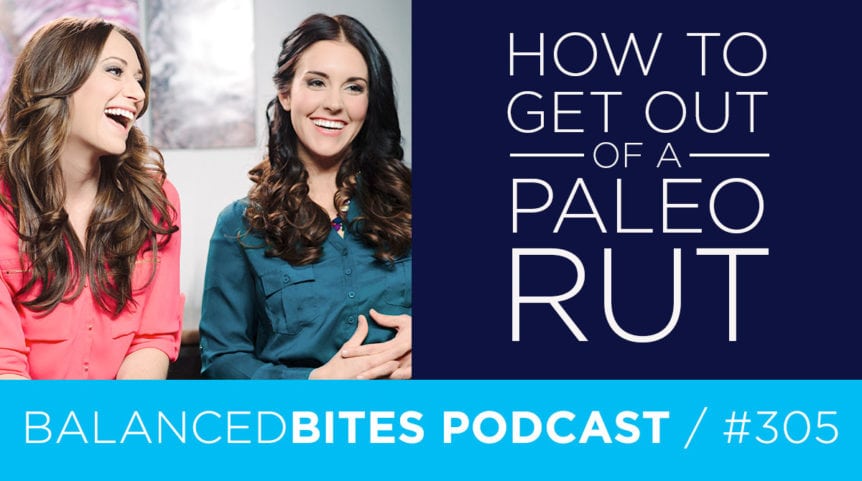



Comments 7
I can totally empathize with hitting a rut/plateau. Great info here as to the why/how, particularly the role of stress. I knew it was a factor, but didn’t realize how large significantly it could impact our metabolism.
It’s interesting… I have psoriasis, and paleo made a huge difference. Then after a few months it would flare again. Then I eliminated something else and things were great! Then it would flare again. Then I started eating wheelbarrows full of spinach and things were great! etc., etc. Just have to stay creative!
Author
Thanks for sharing that, Nick.
Hi Diane,
Maybe your ficus is suffering from too little light? When I first got mine, I had it in a corner of a room that was not near a window. I started losing leaves like you describe and, I even ended up cutting off an entire branch. Once I moved the plant closer to a window (light from the north and west) it is now doing much better.
Thank you for your podcasts/books/videos! I am new to trying paleo. I related a lot to this pod cast. I have been on a fitness journey for four years now. I originally lost 65 pounds over two years. These last two years, I have slowly gained about 30 of it back (ugh). I am trying to figure out what I need to do to get back on track. Trying paleo is one idea I have to attempt this.
As I think about my situation, I am realizing that in the last two years I lost my father, I was diagnosed with arthritis in my left hip (I was a runner and I miss it very much.) and I was in a job that was very toxic. I made a job change in February so, my career is back on track. I am hoping that now will be the time that I can get my weight/health back on track as well.
Thank you,
Jeannie
Author
Hi Jeannie-
So, I had it in a bright but indirectly lit spot for the first week or two, then moved it to where there was some direct light for part of the day, then back to the bright but indirect spot. It seems to be losing fewer leaves now though it still is losing some. It appears to have new growth as well, though, so I am hoping it’s just the transition to this new home versus the garden center where it was partially outside a lot of the time. Hard to tell! I think I also over watered it a bit because I did notice water had drained out of it and a bit was in the bottom tray, so I’m not sure.
This episode isn’t working on iTunes and I haven’t finished it yet 🙁 Could you guys look into? It’s not working on the website either….
Hillary
Author
Looking into this, thanks Hillary! If you have it now, let us know. Sometimes the host systems go haywire!
It’s fixed!! Thank you so much Diane!